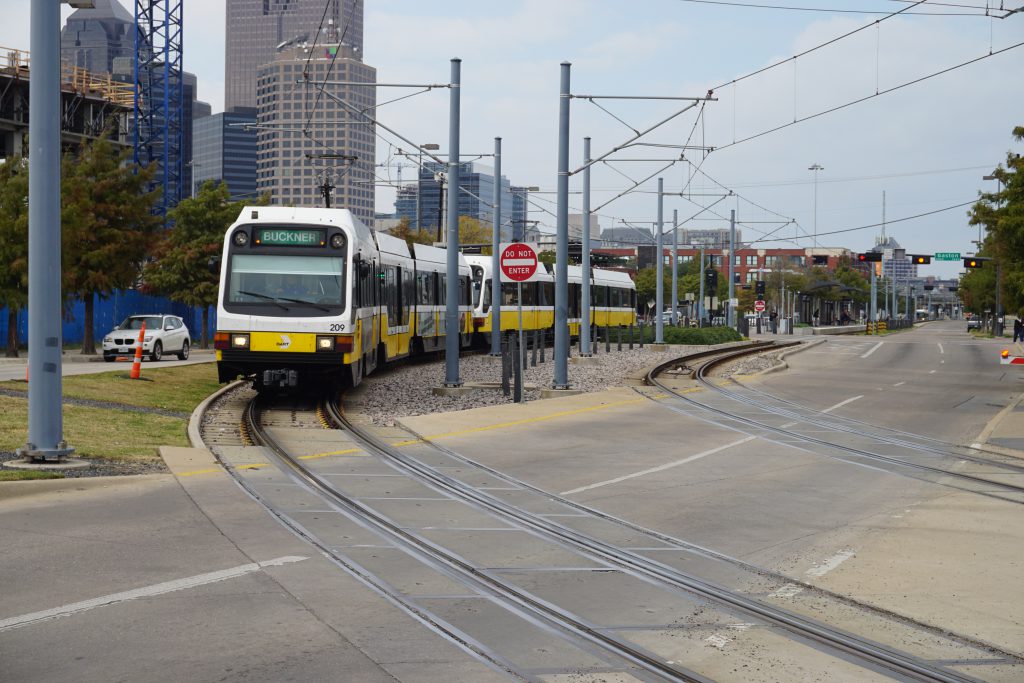Why the US is Bad at Building Transit
All the city news you can use.

A DART Light Rail Green Line train in Dallas, Texas. Photo by Michael Barera / (CC BY-SA).
Want more links to read? Visit The Overhead Wire and signup. Every day at The Overhead Wire we sort through over 1,500 news items about cities and share the best ones with our email list. At the end of the week, we take some of the most popular stories and share them with Urban Milwaukee readers. They are national (or international) links, sometimes entertaining and sometimes absurd, but hopefully useful.
Why the US is So Bad at Building Transit: The United States spent more than $47B on 1,200 miles of new and expanded transit lines from 2010 to 2019, but still lags relative to the rate of transit construction in Europe, Asia, and Latin America. Aaron Gordon notes that the US simply builds less public transit per urban dweller than its peer countries, and that what has been built recently is in sprawling metro areas that do not support transit well. He posits, however, that the issue is a political system uninterested in reforming transportation policy. (Aaron Gordon | Motherboard)
Replica Not Sharing Its Data Sources: Replica, a startup that simulates virtual models of cities and their movement, has shown reluctance for over a year to give Portland Metro sufficient information about its privacy protections. It has failed to provide the transit agency a full report proving that its system is secure from reidentification of actual people. In response, Portland Metro aims to test its vulnerabilities by exposing identities using an unusually detailed Replica data set, a proposition even some experts say has its own privacy risks. (Kate Kaye | Fast Company)
NASA’s Carbon Dioxide Insights: A new NASA study analyzed carbon dioxide emissions from 20 major cities around the world with its first direct, satellite-based evidence that shows as a city’s population density increases, the carbon dioxide it emits per person declines. The study utilized a “top-down” approach to inventory emissions, using satellite derived estimates of the amount of carbon dioxide present in the air above an urban area as the satellite flies overhead. This satellite data is helpful as it can combine emissions from all sources in a city, rather than the “bottom-up” approach of collecting emissions data from individual industrial facilities, transportation, or farms. (NASA Jet Propulsion Laboratory at CalTech)
Minnesota Wants to Limit City Development Rules: In an effort to lower housing costs, a bipartisan group of Minnesota lawmakers have proposed a bill that would bar cities from dictating what materials homebuilders must use or specify that new homes have big garages. Another bill would allow duplexes in any part of Minnesota for single-family homes and ensure cities are making room for higher density housing. The proposals are likely to meet fierce opposition among local leaders who say they must have control over how their communities grow. (Eric Roper | Minneapolis Star Tribune)
Quote of the Week
The design of sustainable communities is not about green technologies. It’s about the underlying code. It’s about zoning. It’s about the building code. It’s about property taxes. In most communities, property taxes, in fact, incentivize people to build bigger rather than smaller because we don’t have a progressive system of property taxation. So these kind of boring things about zoning, and about taxes and about building codes—that’s where the change is going to occur.
-Maurie Cohen in Fast Company talking about what the most equitable size home might be.
This week on the podcast, planners from the SFMTA talk about updating a trolleybus yard and adding housing on top.
Want more links to read? Visit The Overhead Wire and signup. (http://dtrnsfr.us/2iA8Yas)
Transportation
-
Congestion Pricing Cuts Air Pollution in New York City
 Dec 14th, 2025 by Jeff Wood
Dec 14th, 2025 by Jeff Wood
-
FTA Tells Milwaukee to Crack Down on Fare Evasion — Even Where Fares Don’t Exist
 Dec 12th, 2025 by Graham Kilmer
Dec 12th, 2025 by Graham Kilmer
-
Will GOGO’s Bus Service Ever Get Going?
 Dec 9th, 2025 by Jeramey Jannene
Dec 9th, 2025 by Jeramey Jannene
Urban Reads
-
Congestion Pricing Cuts Air Pollution in New York City
 Dec 14th, 2025 by Jeff Wood
Dec 14th, 2025 by Jeff Wood
-
We Think We Love to Drive. But Do We Really?
 Dec 7th, 2025 by Jeff Wood
Dec 7th, 2025 by Jeff Wood
-
Can Scott Wiener Tackle America’s Housing Crisis?
 Nov 23rd, 2025 by Jeff Wood
Nov 23rd, 2025 by Jeff Wood





















